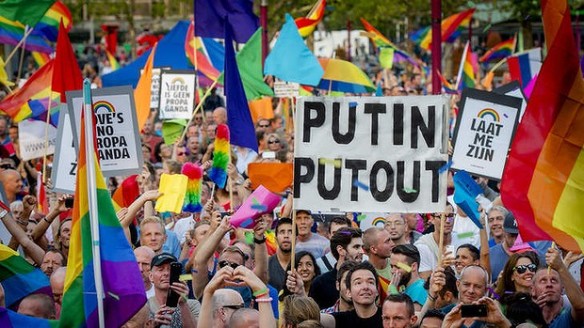by Rosemary Grey
Rosemary Grey joins Beyond The Hague today with a post that questions the ‘constructive ambiguity’ of the gender language in Article 7(3) of the Rome Statute and asks whether persecution on the grounds of sexual orientation can be considered a crime under the jurisdiction of the International Criminal Court. Rose is a PhD Candidate at the School of Social Sciences, Faculty of Arts and Social Sciences, University of New South Wales. She can be reached at r.grey@unsw.edu.au and here.
The Sochi Games has focused international attention on Russia’s human rights record, particularly its laws that discriminate and sow prejudice against lesbian, gay, bisexual, transgender or intersex (LGBTI) people. UN Secretary-General Ban Ki-moon nodded at this issue in his address to the Olympic Committee on February 6, stating:
We must all raise our voices against attacks on lesbian, gay, bisexual, transgender or intersex people. We must oppose the arrests, imprisonments and discriminatory restrictions they face.
Ban’s call to action reflects the fact that in recent years, the UN has become increasingly vocal in promoting LGBTI rights. For example in 2011, the Office of the High Commissioner for Human Rights (OHCHR) published its first report on discrimination and violence on the grounds of sexual orientation and gender identity. The report documents targeted killings, rapes, and assaults of LGBTI people, and highlights decisions and general comments of treaty bodies that confirm that discrimination on the ground of sexual orientation is prohibited under international human rights law.[1] Building on this momentum, in 2013 the Human Rights Office launched the “Free and Equal” campaign, aimed at combating discrimination against LGBTI people worldwide.

August 2013 Protest in Amsterdam. Source: AFP
Meanwhile, discrimination against LGBTI people under domestic law continues in many states, and in some places is getting worse. Russia is not an isolated example: several States Parties to the Rome Statute are also moving backwards on LGBTI rights. For example, Uganda, which in 2004 became the first State Party to refer a situation to the ICC and in 2010 had the privilege of hosting the Rome Statute Review Conference, is in the process of enacting legislation that prescribes life imprisonment for people convicted of homosexual acts. Nigeria, another State Party, has recently enacted anti-homosexuality laws that UN High Commissioner for Human Rights Navi Pillay describes as “draconian.”
